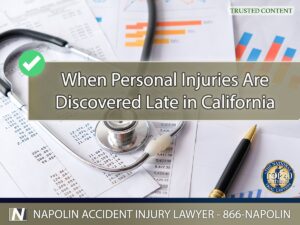What to Do When Personal Injuries Are Discovered Late in California
In California, personal injury cases often arise from accidents where victims suffer immediate and noticeable harm. However, there are instances where injuries manifest days, weeks, or even months after the incident. Understanding how to handle these delayed injury discoveries is crucial for victims seeking justice and compensation. This article explores the legal nuances of late-discovered injuries in California, providing essential information for navigating these complex cases.
The Personal Injury Statute of Limitations in California
The statute of limitations is a critical component of personal injury law in California. It dictates the time frame within which a victim can file a lawsuit. For most personal injury cases, the statute of limitations is two years from the date of the accident. This period is designed to ensure that evidence remains fresh and witnesses can accurately recall events. Missing this deadline generally means forfeiting the right to sue and recover damages.

Situations That May Toll the Statute of Limitations in California
Situations That May Toll the Statute of Limitations in California
In California, there are several common situations where the statute of limitations for personal injury claims may be tolled, meaning the countdown is paused. These include:
- Minor Status: If the injured party is a minor, the statute of limitations does not begin until the individual reaches the age of 18.
- Defendant's Absence: If the defendant is out of the state, the statute of limitations may be tolled during their absence. This prevents the limitation period from running when the defendant is not available to respond to legal proceedings.
- Incarceration: Similarly, if the defendant is incarcerated, the statute may be tolled until their release, ensuring that the plaintiff can initiate a lawsuit when the defendant is able to participate in the legal process.
- Mental Incapacity: The statute of limitations is also tolled if the plaintiff is mentally incapacitated and unable to pursue a claim. The limitation period resumes once the plaintiff regains capacity.
- Fraud or Concealment: If the defendant has committed fraud or concealed their wrongdoing, the statute may be tolled until the plaintiff discovers, or could reasonably have discovered, the deceit.
These exceptions are designed to ensure fairness and allow plaintiffs the opportunity to pursue their claims under equitable conditions. Most of these exceptions fall under the “delayed discovery rule.”
The Delayed Discovery Rule in California
In California, the legal system acknowledges that certain injuries may not be immediately noticeable. Under the “delayed discovery rule,” the starting point of the statute of limitations for filing a lawsuit is altered, shifting it from the date of the injury to the date when the plaintiff first became aware, or should have become reasonably aware, of the injury and its wrongful cause. This legal principle acknowledges that not all harms are immediately detectable and provides individuals the opportunity to seek justice even if the harm is discovered after the standard statute of limitations has expired. The rule is particularly significant in cases where the nature of the injury or the identity of the wrongdoer isn't immediately apparent, thus requiring a reasonable amount of investigation by the plaintiff. The application of this rule encourages vigilance among potential plaintiffs to seek legal advice when they suspect wrongdoing.
The Importance of Medical Attention After an Accident
- Immediate Evaluation: After an accident, adrenaline can mask pain and symptoms. Medical professionals can identify underlying issues, such as internal injuries or concussions, ensuring timely treatment.
- Creating a Medical Record: A comprehensive medical record is vital for personal injury claims, documenting the injuries and their connection to the accident. This record includes initial evaluations, treatments, and diagnoses, serving as proof for insurance companies and courts.
- Monitoring and Documenting Symptoms: Regular follow-up visits allow healthcare providers to monitor symptoms and adjust treatments. These records provide a clear timeline that supports the injury claim and demonstrates the victim's commitment to recovery.
- Preventing Complications: Early medical intervention prevents minor injuries from escalating. For example, untreated internal bleeding can become life-threatening, and untreated whiplash can lead to chronic pain.
- Strengthening Legal Claims: Prompt medical attention provides credible evidence for legal proceedings. Detailed medical records and consistent treatment form a robust foundation for demonstrating the injury's impact.
Even if injuries are not immediately apparent, a thorough medical evaluation can identify potential issues early, providing the best chance for recovery and successful legal outcomes.

Common Types of Delayed Injuries
Common Types of Delayed Injuries
Delayed injuries are those that do not present immediate symptoms but develop over time, often complicating personal injury claims. Some common types of delayed injuries include:
- Internal bleeding, which can be life-threatening if not detected early
- Back pain and nerve damage, which can become chronic and debilitating
- Concussions and other traumatic brain injuries that may initially seem minor
- Whiplash and neck injuries, which may not cause pain until days after an accident
- Tingling and numbness, which can indicate nerve damage or other serious conditions
- Internal injuries from surgical errors, sometimes discovered months or years later
- Ringing in the ears (tinnitus) caused by traumatic brain injuries, which might not appear immediately
- Psychological trauma, including PTSD, which may surface long after the incident
- Soft tissue injuries that can lead to persistent pain and mobility issues
- Delayed onset muscle soreness, which can be severe and impact daily activities
These injuries highlight the importance of seeking medical attention after any accident, even if you feel fine initially. Early medical evaluation can help detect hidden injuries and provide necessary documentation for a future legal claim.
Why You Need a California Personal Injury Lawyer for Delayed Injury Claims
Navigating the legal landscape of delayed injury claims can be complex and daunting. A personal injury lawyer can provide invaluable assistance in these cases. They can help gather and preserve evidence, navigate the intricacies of the delayed discovery rule, and ensure that all legal timelines are met. An experienced attorney can also negotiate with insurance companies on your behalf, striving to secure the maximum possible compensation for your injuries.
If you have suffered an injury that was discovered after an accident, consulting with a personal injury lawyer is a crucial step in protecting your rights and securing the compensation you deserve.
Building a Strong Case for Delayed Injury Claims in California
Building a strong case for delayed injury claims involves several critical steps. These steps ensure that the claim is well-supported and has the best chance of success in securing compensation for the victim.
Gathering Evidence
Gathering comprehensive evidence is fundamental to any personal injury claim. This includes not only medical records but also accident reports, witness statements, and any available video footage or photographs of the accident scene. Each piece of evidence helps construct a detailed account of the incident and the resulting injuries.
Documenting Symptoms and Impact
Victims should maintain a detailed journal of their symptoms and how the injury affects their daily life. This documentation should include pain levels, limitations on activities, emotional impact, and any other relevant details. This personal account can provide compelling evidence of the injury's impact on the victim's quality of life.
Legal Guidance
Navigating the complexities of delayed injury claims requires experienced legal guidance. A personal injury lawyer can help identify all potential sources of compensation, ensure that all deadlines are met, and build a persuasive case. Legal expertise is especially important in delayed injury cases, where proving the link between the accident and the injury can be challenging.

What to Do When Personal Injuries Are Discovered Late in California
What to Do When Personal Injuries Are Discovered Late in California
Navigating the complexities of personal injury claims involving delayed injuries requires careful attention to legal timelines and medical documentation. If you or a loved one has suffered an injury that was discovered after an accident, it is crucial to seek legal guidance immediately.
Napolin Accident Injury Lawyer offers extensive experience in handling personal injury cases, ensuring that your rights are protected and that you receive the compensation you deserve.
Don't wait until it's too late to secure the justice and compensation you need. Contact us today at (866)-NAPOLIN for a free consultation near the Inland Empire. Our dedicated team is here to help you navigate the legal process, gather the necessary evidence, and build a strong case. We are committed to providing comprehensive legal support, ensuring you can focus on your recovery while we handle the complexities of your claim. Reach out to us now and take the first step towards securing the justice you deserve.
- Understanding Uber Accidents and Insurance Coverage Periods in California - April 8, 2025
- A Guide on Red Light Auto Accidents in California - August 14, 2024
- Self-Representing in a California Personal Injury Claim - August 13, 2024
